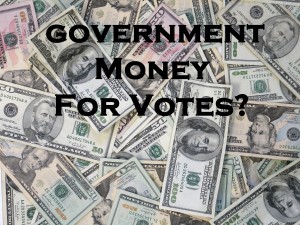Government Money For Votes?
 You may not have noticed this item when the Arkansas General Assembly approved a new budget for the state fiscal year beginning July 1, 2015.
You may not have noticed this item when the Arkansas General Assembly approved a new budget for the state fiscal year beginning July 1, 2015.
In addition, the measures would distribute up to $50 million in surplus funds to rainy-day funding and up to $30 million to the Quick-Action Closing Fund if the state collects more than forecast in the current fiscal year.[i]
First, there is no such thing as “surplus” state money. It is our money.
When the Rainy Day Fund was created it was hyped as a way to save state money for a rainy day. The rainy day being a time when a temporary economic down turn would leave the state short of funds to run essential program. Great idea.
But in practice any day or every day can be a “rainy day.” In practice, the fund gives the governor more discretion over how state money is spent and the fund has been used as a political tool. Use of this fund should be given real criteria.
Senator Jane English – Queen for a Rainy Day
 Perhaps the most infamous use of Rainy Day Funds came in February 2014 when $3.8 million in Rainy Day Funds were pledged to…. lets say…. “sway” a vote. The deal was highly publicized. The Arkansas Democrat-Gazette headline read “Beebe pledge shifts vote.”
Perhaps the most infamous use of Rainy Day Funds came in February 2014 when $3.8 million in Rainy Day Funds were pledged to…. lets say…. “sway” a vote. The deal was highly publicized. The Arkansas Democrat-Gazette headline read “Beebe pledge shifts vote.”
Obamacare Medicaid Expansion (currently known in Arkansas as “Private Option”) was short of the votes needed to gain reapproval in the Arkansas Senate. Enter Senator Jane English (R) of North Little Rock. Senator English had voted against Obamacare Medicaid Expansion in 2013 and had been expected to vote “no” again. But that was before $3.8 million.
English agreed to switch her vote to “yes” in return for a pledge by Governor Beebe.
Beebe told reporters that under his agreement with English the state’s workforce training activities will be consolidated with the state’s existing workforce training funds of $24 million, along with about $3.8 million in rainy-day funds and about $1.2 million in ongoing general revenue already in his proposed budget.[ii]
Former Governor Mike Beebe pointed out that Senator English was not asking anything for herself or her district.[iii] Is that supposed to make it all better? How does that keep the deal from stinking to high heaven? She struck a deal and “poof” the governor suddenly realized it was a rainy day that qualified for Rainy Day Funds for her project. This was Senator English’s pet project! Governor Beebe provided the funds and adopted her plan, and she merely had to give up her credibility in order to vote his way on Obamacare.
Personally, I think she is a nice person. But her action makes her the “poster child” for politicians who throw away their credibility. Credibility matters.
Former Governor Beebe also made this statement about the deal:
“I don’t buy votes. That’s not to say that we haven’t agreed in the past to throw my support for certain things in exchange for a vote.”[iv]
Does Beebe’s statement convince you? Here is how Senator Bryan King saw Beebe’s deal with English:
“The governor has a lot of money and a lot of bully tactics, and he is used to using it to get his way.”[v]
This article is not about one politician or one vote on one issue. It is not even about a previous administration. It is about the integrity of the legislative process, the reasonable use of our money, and a weak budget system that maximizes discretionary use of our money by the governor and legislators.
Legislators are now getting paid like full-time employees. So what keeps them from spending the time necessary to build a better budget with more accountability?
Isn’t it time to hold your elected officials accountable on how they spend your money? Isn’t it time to put monetary limits and real restraints on the use of millions of dollars of discretionary money in funds like the Rainy Day Fund, the Quick Action Closing Fund, and General Improvement Fund?
NOTE: The Quick Action Closing Fund was also mentioned at the beginning of the article. If you are not familiar with the use of that fund read, Corporate Welfare in Arkansas. The article details the use of your money by the state to pick winners and losers among businesses. For CFA articles on the General Improvement Fund see: General Improvement Fund – A Reelection Tool, The Fall & Rise of Legislative Pork in Arkansas, Raiding state funding sources for Medicaid.
[i] 4 budget bills pass in state’s House, Senate, Arkansas Democrat-Gazette, 04/01/2015
[ii] Beebe pledge shifts vote, Arkansas Democrat-Gazette, 02/19/2014
[iii] Ibid
[iv] Ibid
[v] Ibid
